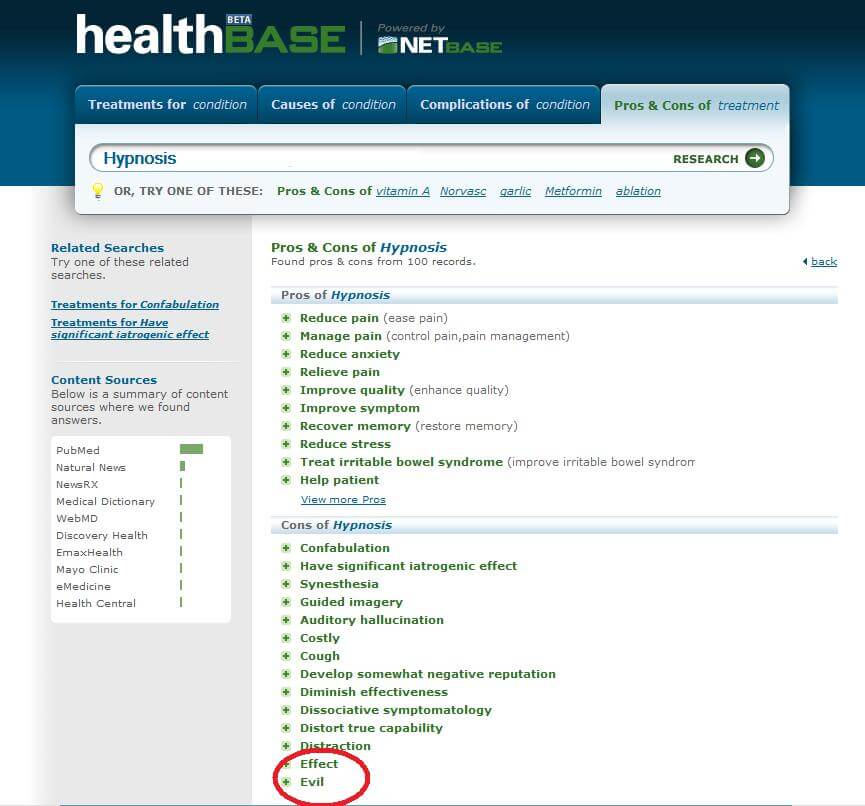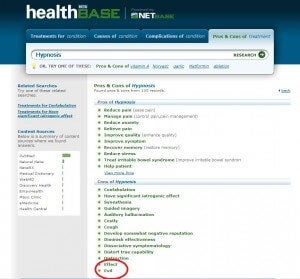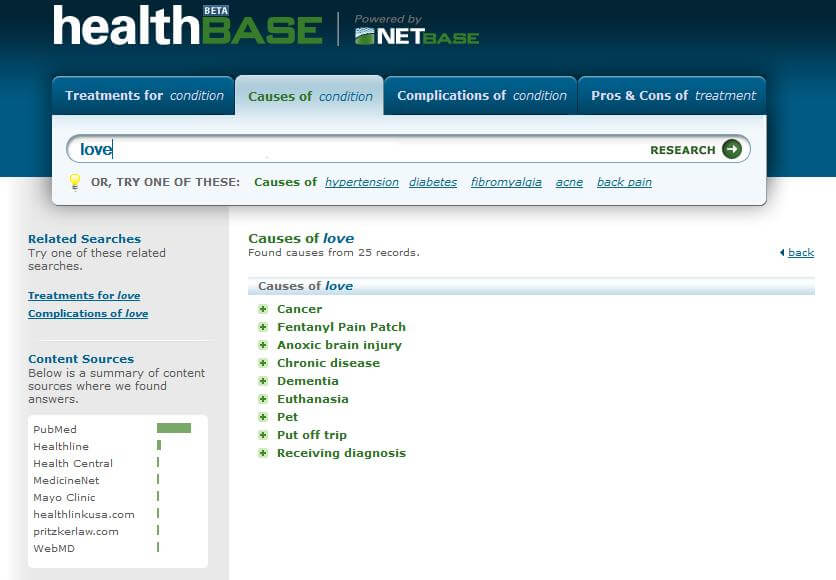healthBase Medical Search Engine has Wins and Epic Fails

Share

Surf the Internet these days and you're likely to drown in a sea of information. New "better than search" engines like Bing, and Wolfram Alpha hope to provide users not just with content, but with the power to use that content to reliably answer questions and make decisions. Netbase, a Silicon Valley based startup is vying to be the new dominant aggregate information site. Their code is supposedly able to review millions of documents and actually understand what it is reading. To prove their point, Netbase established healthBase, a medical search engine that will scour the web to address your medical inquiries. As many users soon came to find out, however, healthBase is definitely still in beta. Check out the demonstration video and some of the screen shots to see some fun examples of how Netbase's technology produces powerful and humorous results.
Even if healthBase is experiencing its birth pangs, the concept behind it is promising. There's simply too much content on the web for anyone to understand on their own. Sifting through that content is a painstaking process rife with pitfalls. Searching for a recipe for lady finger cookies can get you a cookbook, a sex toy shop, a discussion of okra, or the homepage of a rock band. That's fine if you're just out to explore the Internet, but it can be horribly frustrating if you need an answer quickly about topics related to your health. Aggregating and filtering information is going to be a necessary tool as we start to explore the next generation of the web.
Be Part of the Future
Sign up to receive top stories about groundbreaking technologies and visionary thinkers from SingularityHub.


While the code behind healthBase is proprietary, Netbase does explain that it works as a semantics engine. Diagramming sentences, evaluating parts of speech, and all the wonderful things you've forgotten from your elementary grammar lessons help healthBase look through WebMD, Wikipedia, Mayo Clinic, Health.com, and millions of other medical websites. That information is then extracted and listed. Search tabs allow you to specify if you are looking for the treatment, cause, or complications of a condition. They also allow you to explore some of the pros and cons of said treatments. When it works well, it is an amazingly quick way to access medical information and trace it back to its source to learn more.
When healthBase fails though...well, it fails pretty big. Opening day saw the unfortunate treatment of the condition Jews using the applications of alcohol and salts. Yeah, you're going to want to avoid racism in your aggregate search engine. While Netbase was quick to fix the errors that lead to that particular mistake, others are still easily found. Alcohol is a treatment for poverty. Cancer is a cause of love. A con of hypnosis is that it's evil. You learn all sorts of wacky things on the interwebs.

Unlike other health care websites, such as FatSecret, healthBase is not really designed to provide verified and accurate information. The whole purpose of healthBase is to demonstrate Netbase's technology. In that capacity, the website is less than impressive because of its unreliability. Search for myopia and you get amazingly helpful information, search for AIDS and you run the risk that the semantics code doesn't distinguish between the disease and the people who assist you in an office.
As TechCrunch covered in a recent article, Netbase is playing catch up and reminding users that the healthBase website isn't a "ready for prime-time consumer search engine." Still, if Netbase really wanted to demonstrate the power of its technology, shouldn't they have waited to launch until they were ready? And why work out the bugs in a field like medicine, where reliability and trust are at the very top of the list of requirements?
Aggregate information sites are a trend that is likely to continue. The same is true for semantics search engines. Whether healthBase, or some other demo from Netbase, becomes successful, you can bet that we're all going to be looking for ways to mediate and prioritize the data we find on the Internet. The healthBase glitches demonstrate that automated approaches may take a while to get to the same level as professionally reviewed journals, or even wikis. Which is fine, I can be suspicious of hypnosis all on my own.
Related Articles

This Light-Powered AI Chip Is 100x Faster Than a Top Nvidia GPU

How Scientists Are Growing Computers From Human Brain Cells—and Why They Want to Keep Doing It

These Brain Implants Are Smaller Than Cells and Can Be Injected Into Veins
What we’re reading